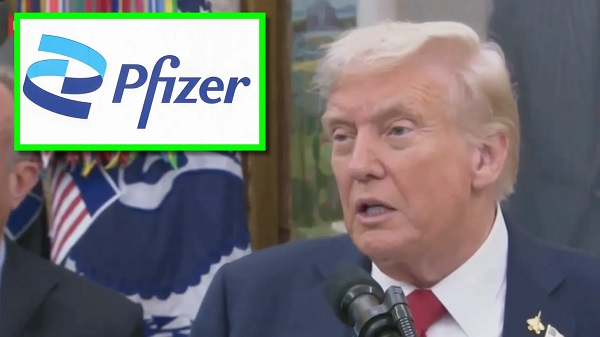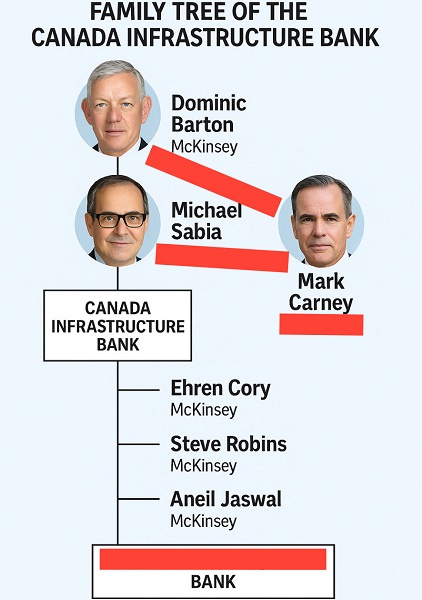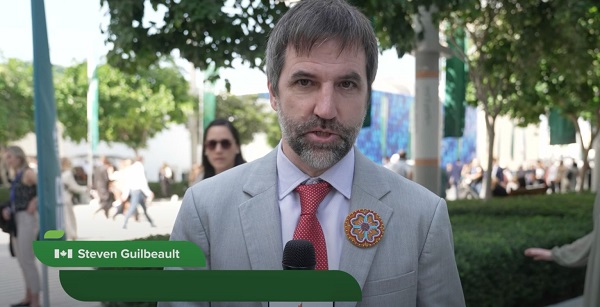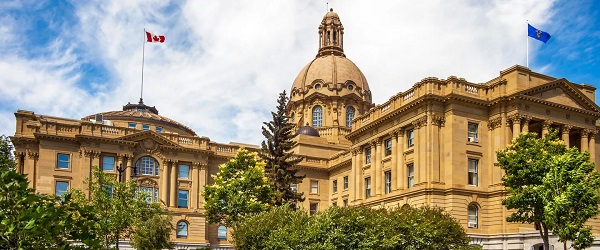Business
Pfizer Bows to Trump in ‘Historic’ Drug Price-Cutting Deal

Under the agreement, New York-based Pfizer will charge most-favored-nation pricing to Medicaid and guarantee that pricing on newly launched drugs, Trump said. That involves matching the lowest price offered in other developed nations.
In a landmark announcement, President Trump revealed a deal with Pfizer that slashes drug prices for Americans on Medicaid on a massive scale.
Under this agreement, Pfizer will offer its medications to Medicaid at “most favored nation’s prices.”
Under the agreement, New York-based Pfizer will charge most-favored-nation pricing to Medicaid and guarantee that pricing on newly launched drugs, Trump said. That involves matching the lowest price offered in other developed nations.
“It’s going to have a huge impact on bringing Medicaid costs down like nothing else,” the president said.
“I can’t tell you how big this is,” he added.
The conference opened with Trump telling Pfizer CEO to his face that he is “surprised” he is agreeing to massive price cuts to his company’s drugs.
Albert Bourla smiled and stood silently as Trump announced devastating news for his company’s profits in America.
RFK Jr. heaped praise on President Trump for several minutes after he struck a deal that other politicians said was impossible.
Kennedy called it something “Democrats have wanted for 20 years, Republicans have wanted for 20 years,” but said no president had ever been able to make it happen until Trump pushed drug companies to the table.
“All we could see was all the reasons this couldn’t happen. Everybody tried. Nobody could make it happen. And it was President Trump alone who, with his doggedness and persistence, saw this clearly in a way that none of us [did],” Kennedy said.
“I can’t think of any other president in the United States that could have done this in our history.”
Dr. Oz couldn’t hide how proud he is to work for the White House — calling it a “cool place to work” after Trump did the impossible in a “historic” deal that forced pharmaceutical giants to stop ripping Americans off on drug prices.
He said the team had been working “24/7 nonstop with industry, with Albert [Bourla], with his great team at Pfizer” to get them to sell prescription drugs to Medicaid at the lowest global rate.
“We’re going to finally deliver on the fair drug prices that President Trump has been speaking about for two terms. We’re going to celebrate this historic day. I predict this historic day [will have a positive impact] in the medical field for generations to come,” Dr. Oz declared.
When Pfizer CEO Albert Bourla got his chance to speak, he revealed that President Trump made four specific requests to lower drug prices in America — and Pfizer’s deal today meets ALL of them.
Bourla admitted America was in an “unfair situation” while “other rich nations refused to pay their fair share for the medical innovation.”
That’s changing. Under the new agreement, Medicaid sale prices will drop significantly. Meanwhile, other countries that have long paid rock-bottom prices will see modest increases.
The big winner in this deal, Bourla said, was “the American patient.”
“Who else is a winner here?” he asked. “It is American innovation and American economy.”
Trump suggested that the breakthrough on drug prices could also translate to lowering health insurance.
In terms of real-world results, Trump called it “massive.” He explained how a drug that sells for $137 in America will drop to just $15 to $18.
In other countries, the same drug is sold for only $10, and they will now have to raise the price slightly.
But America is no longer footing the bill, so the rest of the world can get cheap drugs. And finally — in a move once thought impossible — Americans on Medicaid will be paying a fair price.
Business
Bill C-8 would allow minister to secretly cut off phone, Internet service

From the Canadian Constitution Foundation
“I worry that this law could be used to secretly cut off political dissidents from their phone or Internet service on the pretense that they may try to manipulate the telecom system”
The Canadian Constitution Foundation is concerned about the civil liberties implications of the Carney government’s proposed cyber security bill, C-8, which would allow the minister of industry to secretly order telecommunications service providers like Telus, Bell and Rogers to stop providing services to individual Canadians.
The minister would be allowed to make such an order if she has “reasonable grounds to believe that it is necessary to do so to secure the Canadian telecommunications system against any threat, including that of interference, manipulation, disruption or degradation.”
An individual who does not comply, including by failing to keep the order secret, could face fines of up to $25,000 for the first contravention and $50,000 for subsequent contraventions. Businesses could face fines of up to $10 million for the first contravention and up to $15 million for subsequent contraventions.
The orders would remain secret indefinitely, with the minister required only to present an annual report to Parliament on the number of orders made and her opinion on their necessity, reasonableness and utility.
CCF Counsel Josh Dehaas said that the power to cut off the Internet or cellphone service of Canadians is a “very serious power that requires very strong safeguards, which are presently lacking in the bill.”
“While this power may be necessary in some cases to prevent cyber attacks, it also poses serious risks to civil liberties,” Dehaas said. “I worry that this law could be used to secretly cut off political dissidents from their phone or Internet service on the pretense that they may try to manipulate the telecom system,” Dehaas explained. “Such an action would violate our most cherished freedoms including free speech.”
CCF Litigation Director Christine Van Geyn said that the government cannot be trusted with such a power unless proper safeguards are in place.
“You may think that the idea of the government cutting off political dissidents from the necessities of life sounds far-fetched, but that’s exactly what happened during the 2022 Freedom Convoy protests in Ottawa,” she said. “The federal government ordered banks to freeze hundreds of bank accounts without any judicial authorization, cutting protesters off from their money in the middle of a very cold winter.”
“Although the Federal Court agreed with the CCF that freezing bank accounts this way violated the constitutional right to be secure against unreasonable searches and seizures, that kind of damage isn’t easily repaired,” Van Geyn added.
Ottawa has appealed the Federal Court’s finding. The CCF is awaiting a decision from the Federal Court of Appeal.
Dehaas said that Parliament should consider requiring either judicial pre-authorization or an immediate, automatic judicial review of any decision to cut off an individual or business from their Internet or phone.
The CCF is also concerned that Bill C-8 would allow the minister to weaken telecommunications companies’ encryption standards, allowing for unconstitutional access to Canadians’ private information.
Finally, the CCF is concerned that the bill could allow the minister or any person designated by the minister to engage in unconstitutional searches.
Joanna Baron, the CCF’s Executive Director, said that Canadians must be vigilant about their constitutional rights and freedoms because they can be easily taken away, especially in times of crisis.
“I would encourage Canadians to fight for their freedoms, whether it’s by taking the CCF’s free privacy course, signing up for our weekly Freedom Update newsletter or becoming a monthly donor,” Baron said.
“Concerned Canadians are also encouraged to write to their MPs using our form letter, to tell them to amend these bills to ensure Canadians’ rights to privacy and free expression are protected,” Baron added.
Alberta
Taxpayers: Alberta must scrap its industrial carbon tax

-
Carney praises carbon taxes on world stage
-
Alberta must block Carney’s industrial carbon tax
The Canadian Taxpayers Federation is calling on the government of Alberta to completely scrap its provincial industrial carbon tax.
“It’s baffling that Alberta is still clinging to its industrial carbon tax even though Saskatchewan has declared itself to be a carbon tax-free zone,” said Kris Sims, CTF Alberta Director. “Prime Minister Mark Carney is cooking up his new industrial carbon tax in Ottawa and Alberta needs to fight that head on.
“Alberta having its own industrial carbon tax invites Carney to barge through our door with his punishing industrial carbon tax.”
On Sept. 16, the Alberta government announced some changes to Alberta’s industrial carbon tax, but the tax remains in effect.
On Friday night at the Global Progress Action Summitt held in London, England, Carney praised carbon taxes while speaking onstage with British Prime Minister Keir Starmer.
“The direct carbon tax which had become a divisive issue, it was a textbook good policy, but a divisive issue,” Carney said.
During the federal election, Carney promised to remove the more visible consumer carbon tax and change it into a bigger hidden industrial carbon tax. He also announced plans to create “border adjustment mechanisms” on imports from countries that do not have national carbon taxes, also known as carbon tax tariffs.
“Carney’s ‘textbook good policy’ comments about carbon taxes shows his government is still cooking up a new industrial carbon tax and it’s also planning on imposing carbon tax tariffs,” Sims said. “Alberta should stand with Saskatchewan and obliterate all carbon taxes in our province, otherwise we are opening the door for Ottawa to keep kicking us.”
-

 Business2 days ago
Business2 days agoDominic Barton’s Shadow Over $1-Billion PRC Ferry Deal: An Investigative Op-Ed
-

 Censorship Industrial Complex2 days ago
Censorship Industrial Complex2 days agoCanada To Revive Online Censorship Targeting “Harmful” Content, “Hate” Speech, and Deepfakes
-

 Alberta2 days ago
Alberta2 days agoAlberta refuses to take part in Canadian government’s gun buyback program
-

 Alberta2 days ago
Alberta2 days agoOrthodox church burns to the ground in another suspected arson in Alberta
-

 Alberta2 days ago
Alberta2 days agoAlberta puts pressure on the federal government’s euthanasia regime
-

 Fraser Institute1 day ago
Fraser Institute1 day agoAboriginal rights now more constitutionally powerful than any Charter right
-

 Alberta1 day ago
Alberta1 day ago$150 a week from the Province to help families with students 12 and under if teachers go on strike next week
-

 Business1 day ago
Business1 day agoNew PBO report underscores need for serious fiscal reform in Ottawa













